One of the most significant crops in the tropics, cassava, provides food for 500 million people in more than 80 countries. The destructive disease known as cassava bacterial blight (CBB) results in crop losses all across the world.

Image Credit: Donald Danforth Plant Science Center
The Donald Danforth Plant Science Center member Rebecca Bart, PhD, and her associates at the University of California, Los Angeles, and the University of Hawaii at Manoa conducted ground-breaking studies that showed how epigenome editing, a new technology, can lessen the symptoms of CBB in cassava plants while maintaining healthy growth and development.
These discoveries will pave the way for employing epigenome editing to enhance other crops in addition to increasing cassava resistance to CBB, which has the potential to raise yields for farmers. The study was published in the journal Nature Communications.
This was the first time that targeted methylation was used to introduce an agronomic trait into an important crop.”
Kira Veley, PhD, Study First Author and Senior Research Scientist, Donald Danforth Plant Science Center
The cassava plants produced as a consequence of the study team’s deployment of the technology to consciously boost disease resistance to CBB had smaller and less severe signs of the disease on their leaves.
Methylation is one type of epigenetic DNA “decoration” that cells utilize to regulate gene expression without altering the DNA sequence itself.
Targeting methylation to specific sites in the epigenome is a really new thing.”
Jim Carrington, PhD, Study Co-Author and President and Chief Executive Officer, Donald Danforth Plant Science Center
The scientists at the Danforth Center and Steve Jacobsen’s team at UCLA have been working together on this project for a while. The Jacobsen laboratory carries out fundamental research on methylation and epigenetics.
Their study is a compelling example of the importance of using cutting-edge methods on crop species with limited resources, and their approach might one day be effectively applied to many other plant systems.
One of the wonderful things about this project was the successful transfer of knowledge between a model plant system, Arabidopsis, and an important food security crop, cassava. Crops like cassava are often left behind when it comes to new frontiers in technology. This is one reason we are particularly excited to have applied these tools in cassava first.”
Rebecca Bart, PhD, Principal Investigator, Donald Danforth Plant Science Center
The Bart lab is working to understand the environmental triggers of outbreaks of cassava bacterial blight along with how the disease will be impacted by a changing climate. The researchers are presently cultivating plants in Hawaii to examine inheritance across several generations to assess the heritability of their new CBB-resistance trait.
The team is eager to carry on with their research and maybe create new management methods for additional diseases since, in addition to CBB, numerous viruses also reduce cassava yields.
Source:
Journal reference:
Veley, K. M., et al. (2023). Improving cassava bacterial blight resistance by editing the epigenome. Nature Communications. doi.org/10.1038/s41467-022-35675-7